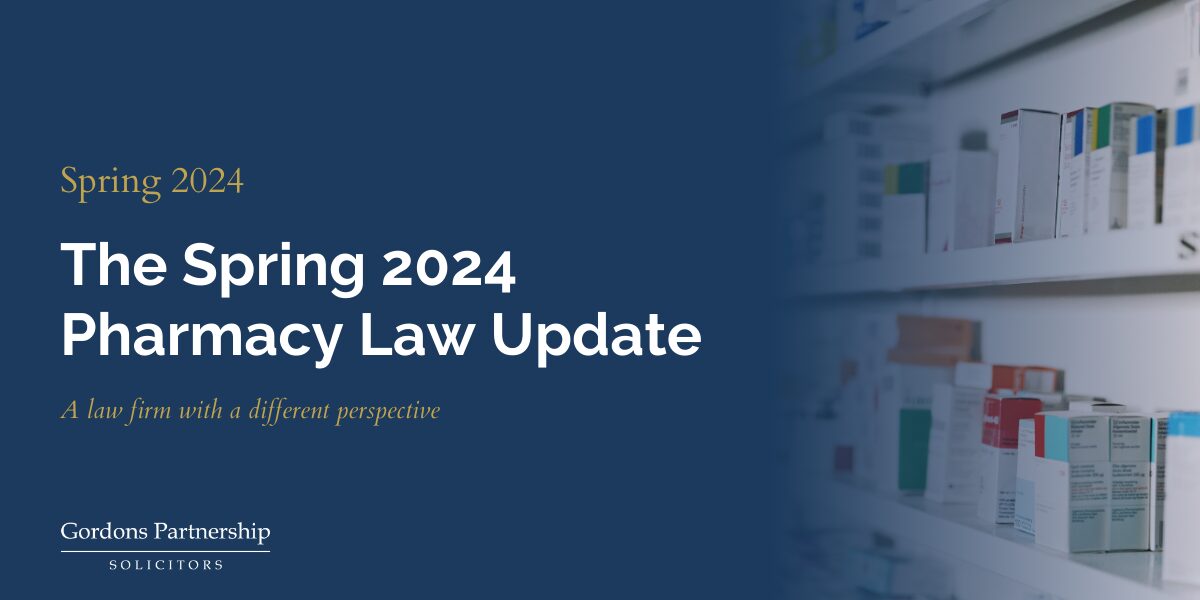The beginning of 2024 has seen some fundamental changes in the services that pharmacies provide and who provides them. There have been three big headlines:
1 – The introduction of the Pharmacy First scheme on 31 January 2024
with over 95% of pharmacies signed up to provide it.
2 – Change to the pharmacy professionals providing pharmaceutical services.
I wrote about the consultation on supervision here https://www.gordonsols.co.uk/whats-the-law-on-pharmacy-supervision/ summarising the changes suggested in the consultation on supervision.
The consultation has three core proposals. Firstly, that a pharmacist could authorise a pharmacy technician (orally or in writing) to prepare, assemble, dispense and sell and supply P and Pom medicines. The pharmacy technician will therefore supervise this or carry it out themselves.
Secondly, that any member of a pharmacy team can be authorised by the pharmacy to hand out checked prescriptions if the pharmacist is absent, where clear SOPs are in place to direct this authorisation.
Thirdly, that chief pharmacists in hospital aseptic facilities will oversee the pharmacy service as a whole, but registered pharmacy technicians will supervise the preparation, assembly and dispensing of medicines in these facilities.
There are proposed legislative amendments to the Medicines Act 1968 and the Human Medicines Regulations (“HMR”) 2012.
Amendments to the HMR to permit registered pharmacy technicians to supply medicines under a PGD will be coming into force on 26 June 2024.
3 -Hub and spoke
The government response to the consultation came out on 13 May and some significant changes to legislation are proposed. I will be blogging about this in more detail in Chemist and Druggist shortly but some of the main points are:
- Permission for hub and spoke arrangements between unconnected entities
- Permission for “hubs” to provide medicines directly to patients – there will be legal changes to set out a new type of retail sale.
- Arrangements between the hub and spoke to be set out in writing and be legally binding.
The timing, and whether the changes will happen at all, is uncertain as the dissolution of parliament took place on 30 May 2024, and an enabling statuary instrument was neither laid before parliament nor debated.
Case Updates
Effect of interim measures
Aga v General Dental Council [2023] EWHC 3208 (Admin)
In this General Dental Council (GDC) decision the High Court ruled on the long-held position that where an immediate order was imposed after Fitness to Practise proceedings to protect the public during the appeal period, it was separate to a final order of suspension or conditions of practice. The effect was that, the final order would not start running until the end of the appeal period. The court have now said this was incorrect and the immediate order should be counted as part of the suspension order. The GDC has said there will be an appeal but have provided no updates since January. The case is already being acknowledged by the GPhC. In a recent case we were involved in, the FtP chair cited the case with approval and indicated that any interim suspension measures ordered at the end of the hearing would count as part of the overall suspension.
Sexually Motivated Misconduct Cases
Farooq Mohammed- GPhC
The registrant was an independent prescriber who worked as a locum clinical pharmacist at a GP practice. He had conducted an internal vaginal examination of a patient who attended due to abdominal pain. She was not sexually active and did not have a problem in her vaginal area. The Committee found that his examination was carried out with a lack of clinical justification. The Committee determined, however, that the Registrant’s conduct was not sexually motivated, and that his motivation at the time was a ‘false and wholly mistaken belief that an intimate examination was justified, and that he was suitably qualified to carry it out.’ He was suspended for 6 months.
Simon Smith – GPhC
The registrant was a pharmacist accused of sexually motivated misconduct in relation to a patient and his colleagues. In relation to the female patient, he questioned why she wanted to purchase Canesten cream and made her say that it was for her vagina aloud and in front of others. The committee considered this was not sexually motivated as it was clinically appropriate, but he caused embarrassment and it was found to be a breach of standards. In relation to colleagues, the committee found sexually motivated comments had been made. Conditions were imposed but the registrant is appealing.
Racism
Nazim Hussain Ali [2024] EWHC 577 (Admin)
The registrant is a pharmacist who was issued with a warning by the Committee for antisemitic remarks he made at a political rally, which amounted to misconduct. Following an initial appeal by the Professional Standards Authority (PSA), the High Court determined that the Committee should not have applied a subjective test in determining whether his comments were antisemitic. The case was re-heard by the Committee and an objective test was applied but the sanction was again a warning. The PSA appealed for a second time on the basis that a warning was insufficient due to the seriousness of racism, but this was dismissed by the High Court. The dismissal of this appeal coincided with guidance published by the GPhC, which highlighted that the use of racially motivated actions or words should face consideration of outcomes at the upper end of the scale.
MHRA matters
There have been important announcements from the MHRA this year.
Medicines shortages – the MHRA has announced regulatory processes to manage supply disruptions, which aim to relax some restrictions on importation of medicines. As part of the announcement, the MHRA have issued a reminder of its position on wholesaling between pharmacies, that pharmacists may “supply small quantities of a medicine to another pharmacist to meet a patient’s individual needs without the requirement of a Wholesale Dealers’s Licence”.
A strategy on AI and medicines regulation has been published. At the moment the MHRA has confirmed that the current medical devices legislation still stands and the device should conform to the requirements throughout its whole lifecycle. The strategy also highlights the legal obligations of manufacturers in terms of their responsibility and accountability to mitigate risks.
There are proposals for regulations to be strengthened to increase accountability and governance, and it will be important for pharmacies to know where responsibilities lie. However, the debate about AI driven robot dispensing has shown that AI is going to be a hugely complex area in determining liabilities. The MHRA strategy is part of a wider “roadmap” that sets out the plans for the overhaul of the UK medical device regulations.
GPhC Consultations
The consultation on Quality Assurance of Pharmacy Education and Training is currently live and closes on 13 June and is accessible at the below link:
It introduces the GPhC’s proposals to strengthen quality assurance in assurance in pharmacy education and training.
The consultation on draft Standards for Chief Pharmacists has just closed. The standards were drafted in response to the Pharmacy (Preparation and Dispensing Errors – Hospital and Other Pharmacy Services) Order 2022, which removed the threat of criminal penalties for preparation and dispensing errors by pharmacy staff in hospitals and similar settings.
Property Corner
The Landlord and Tenant Act 1927 (LTA 1927) provides tenants of business leases with the right to compensation for improvements made to the property they hold, provided specific conditions are met. Any improvement made to the property must still be in place at the end of the tenancy. To qualify for compensation, tenants must have validly served a section 3 notice to the Landlord. If the Landlord does not object to the improvement within three months, or where the Landlord objects, the Tenant secures authorisation from the First Tier Tribunal, then the Tenant may proceed with the improvements. The total compensation that can be claimed is the smaller of the amount of the increase in the value of the property (not including VAT) or the (reasonable) cost of making the improvement.
The provisions in the LTA 1927 cannot be disapplied by contractual terms but while Tenants have the right to compensation for improvements made, there are several ways in which paying compensation to Tenants is avoided by Landlords. The most common is a lease requirement for the Tenant to remove its alterations at the end of the term. A well-advised purchaser of commercial property will check to see whether any works at the property qualify under the LTA 1927 and a well-advised landlord will immediately seek further, detailed legal advice immediately if it receives a section 3 notice.
If you would like advice on property matters , please contact Adrian Jones.
Commercial Property Lawyer
Tel: 01483 451900
Email: adrian@gordonsols.co.uk
Frequently Asked Questions
This edition’s FAQ is about change of hours in NHS pharmacies.
Q: Under the revised regulations is it possible to make a successful application to change core hours which include Sunday opening as I have heard many applications are refused?
A: Gordons have had recent successes in applying for change of opening hours at ICB and appeal level including Sunday opening. The applications are made under paragraph 26 (2A) of Schedule 4 of the NHS (Pharmaceutical and Local Pharmaceutical Services) Regulations 2013. The regulations offer an alternative of a change which maintains as necessary the existing level of service (sub paragraph (a)) or to maintain a sustainable level of adequate provision where maintaining the existing level of service is either unnecessary or not realistically achievable (sub paragraph (b)). Giving the current difficulties many pharmacies are experiencing the concession about realistically achievable services would appear important but, as yet, the majority of change applications appear to be granted on the basis permitted in sub paragraph (a).
If you would like advice on any of the issues above, please contact the author.
This update should not be taken as advice for any particular circumstance and legal advice should be sought for a specific matter.
Articles: In-person GPhC hearings: Susan Hunneyball Chemist + Druggist
About the Author

Healthcare Regulatory Lawyer
- D.D: 01483 366064
- Tel: 01483 451900
- Email: susan@gordonsols.co.uk
